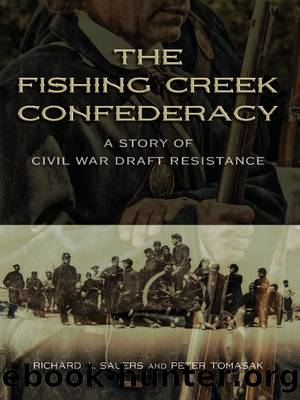The Fishing Creek Confederacy by Richard A. Sauers

Author:Richard A. Sauers
Language: eng
Format: epub
Publisher: University of Missouri Press
CHAPTER 11
THE WAR'S END AND KNOB MOUNTAIN
As the military trials wound down and the men found guilty were sent back to Fort Mifflin, the war continued. More men were needed at the front and the draft also continued. A supplementary draft in late December 1864 affected townships in Columbia County that had not met quotas in previous drafts. Seven townships saw 117 men drafted, with 62 required. On January 15, 1865, another supplemental draft was made in six townships for thirty-eight additional men. Finally, more names were drawn at Troy on April 14, 1865. This was a full draft under the last call made by the president.1
As the drafts continued, there were changes in state leadership. Major Dodge increasingly came under criticism from both civilians and state officials alike. The major had continued to improve the draft bureaucracy and its paperwork, much to the disgust of âpolitical cliques and cabals of the State.â Dodge reported that he had resisted all attempts to insert incompetent persons into the draft bureaucracy and further had declined to change any of his orders to please clients of such people. Governor Curtin and Secretary of State Eli Slifer both attacked Dodge, and the state legislature censured the major for his supposed failings. Major Dodge requested and was granted an official inquiry into his administration of the Pennsylvania draft. The investigation cleared him of any criticism. Still, Secretary Stanton and Brigadier General Fry asked Dodge if he would transfer to New York State as acting assistant provost marshal general for the Southern Division of that state. In turn, Brigadier General Edward W. Hinks, then in command in southern New York, would replace Dodge in Pennsylvania. The official order was dated February 27.2
A change also took place in the Thirteenth District. Colonel Freeze remarked after the war that many residents felt that Columbia County's enrollment and quota had consistently been overstated by the enrolling officers. Freeze wrote that perhaps three times the actual quota had been assigned to the county. âBut there was neither redress nor abatementâneither credit for the over plus already sent into the field, nor a reduction of the number to be furnished, when the egregious outrage was certified to them.â Senator Buckalew introduced an amendment to the draft law that provided relief for any townships or counties that could provide revised figures before any draft. Yet county officials continued to protest the War Department's continued injustices. Brigadier General Fry finally sent an investigating commission, which in March relieved Captain Manville and replaced him with Captain Silver. The investigating committee found that in the entire Thirteenth District, Captain Manville had claimed that 11,237 men were liable for military service, when in fact the more accurate figure was only 6,685. The commander of the draft rendezvous in Carlisle commented that ânearly all the professional bounty jumpers that pass through this rendezvousâ came from the Thirteenth District. Legitimate recruits from the district complained that many âhave been most shamefully imposed upon.â3
The fates of the prisoners found guilty were all resolved as the war wound down.
Download
This site does not store any files on its server. We only index and link to content provided by other sites. Please contact the content providers to delete copyright contents if any and email us, we'll remove relevant links or contents immediately.
Cat's cradle by Kurt Vonnegut(15339)
Pimp by Iceberg Slim(14489)
4 3 2 1: A Novel by Paul Auster(12377)
Underground: A Human History of the Worlds Beneath Our Feet by Will Hunt(12090)
The Radium Girls by Kate Moore(12019)
Wiseguy by Nicholas Pileggi(5771)
The Fire Next Time by James Baldwin(5432)
Perfect Rhythm by Jae(5398)
American History Stories, Volume III (Yesterday's Classics) by Pratt Mara L(5301)
Paper Towns by Green John(5181)
Pale Blue Dot by Carl Sagan(4996)
A Higher Loyalty: Truth, Lies, and Leadership by James Comey(4955)
The Mayflower and the Pilgrims' New World by Nathaniel Philbrick(4495)
The Doomsday Machine by Daniel Ellsberg(4485)
Killers of the Flower Moon: The Osage Murders and the Birth of the FBI by David Grann(4443)
The Sympathizer by Viet Thanh Nguyen(4385)
Too Much and Not the Mood by Durga Chew-Bose(4338)
The Borden Murders by Sarah Miller(4315)
Sticky Fingers by Joe Hagan(4189)
